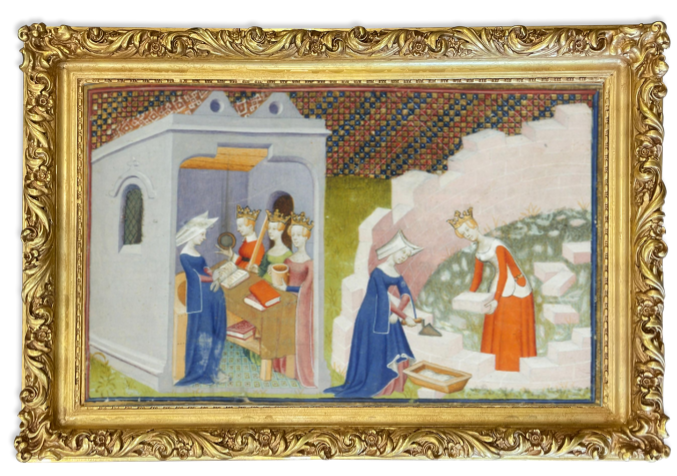

Christine de Pisan was a cool lady from a long time ago, in a place called France. She was a writer and talked a lot about making things fair for women. She wrote all kinds of stuff like poems, stories, and even books about important women's rights.She grew up in Paris with her dad, who worked for the king. We're not sure how she learned so much, but because of her dad's job, she had access to lots of awesome libraries. In 1380, she married a guy named Etienne. Sadly, he passed away and instead of getting married again, she decided to support her family by writing.Even though Christine wrote mostly for rich people who could read, her words were like seeds that grew the idea that everyone should be treated fairly.
Christine wrote about a lot of things that girls and women had to deal with. She talked about how they didn't get as much education and how society wasn't always fair to them. But she was smart about it—she used fancy words and cool writing tricks. Her most famous works are "The Tale of the Rose" and "The Book of the City of Ladies." In "The Book of the City of Ladies", she imagined a city where only good and strong women lived.

Christine de Pisan says she was compelled to read a book she had found. She explains how she had heard that the book talked about respect for women. However, this was not true. This book is filled with insults about women and how they act. Christine de Pisan says how all these philosophers (people who like to be asked big questions) and poets spoke about women as they all talk from the same mouths, “it seems that they all speak from the same mouth.” It’s almost like they all agreed how women are bad. All these mean things said about women made Christine question herself and her character (Who she is as a person). This shows how little women were valued in this time period. She then thought about other women that she knew and questioned how these men who said these things about women could be right, but then she thought all these smart men could have the same opinion of women and be wrong; she thought it had to be true. This led to her relying on what other people thought of her rather than what she thought about herself, and it did not matter what her accomplishments were. This is something that we can see similarly in women today because some women are overlooked in the workplace and often do not get the recognition they deserve only because they are not men. All these things that men had said about women made her feel disgusted with herself. In her writing, she says, “And I finally decided that God formed a vile creature when He made women.” She wondered that if women are as bad as they are made to be, then why would God create them? She believed that women were monsters, was ashamed to be a woman, and was disgusted with all women.
She continues her writing as a story with three characters: Lady Reason, Lady Rectitude (Lady Honesty), and Lady Justice. Lady Reason explains why they want to get rid of errors in society that have caused women to be treated badly. They believe that women need protection. Lady Reason explains how people at this time believed it was not okay for men to serve women because it made men look less important. It is blamed on women that men were banished because of Eve and her mistake (eating the forbidden fruit). This shows that people had no respect for women; they were believed to not be skilled or useless. Lady Reason explains that even though men Eve made a big mistake, Mary (the mother of Jesus) provided humans with way more than what was taken away.
Christine explains to Lady Reason that women have done many good things, and she finds it strange that men do not want women to be educated because they believe that women will behave badly. Lady Reason agrees and tells her about men who do not believe women are worthless. Her example was Giovanni Andrea, who thought teaching his daughter law was a good idea. She also explains to Christine that her father, a scientist, did not believe women were useless if they understood science, "he took great pleasure in from seeing your inclination to learning." This shows that not all men saw women badly in her time. Some thought the education of women was good.
Lady Reason explains that men criticize women for different reasons. There are some who do it with good intentions, but that does not make it okay. Some do it because of their own bad habits or because they are sick or disabled. Some are jealous because they feel that a woman is smarter than them. Men belittle women because of their need to be better. This belittling of women condenses their rights and their importance in society.
Christine de Pisan praises women, especially Queen Ceres, Isis, and Minerva, for their important contributions to humanity. Queen Ceres encouraged nomads to come to the towns and gave them better food. Isis helped in teaching agricultural techniques. Mivera invented useful things like woolen garments and armor. Christine explains her anger with men who say bad things about women, because there had been so many important things that had a big impact on society through innovations and inventions.
